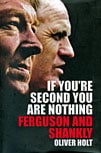 Ferguson and Shankly
Ferguson and Shankly
by Oliver Holt
Pan, £8.99
Reviewed by David Stubbs
From WSC 250 December 2007
Sir Alex Ferguson and Bill Shankly have some things in common, opines Oliver Holt, not least in their sharing of the sentiments expressed in the title to this double biography. For Ferguson, the need to prevail – to compensate, perhaps, for the setbacks and disappointments of his early working life – was deep-dyed. He was even known, when a game of cards with his players wasn’t going well, to chuck the entire pack across the coach in fearsome, capillary-bursting pique. As for Shanks, he outlined the attitudes that made him practically a hermit to football in an uncharacteristically revealing letter to a journalist in 1955. “I used to think that it would be better to die than to lose,” he wrote. “To enable me to reach the top, I went to all extremes, no woman, no smoking, early to bed – this went for years, but it was worthwhile.”
However, If You’re Second… is more about contrast than comparison. Holt believes that Shankly resigned too soon, at 60, while Sir Alex Ferguson, who had vowed to retire at that age, has stayed on too long. Some may argue that Man Utd’s resurgence calls that judgment into question, but reading between the lines, or indeed reading the actual lines, it’s clear that Holt takes a bit of a dim view of Sir Alex. He compares him at the age of 63, taking applause from the fans at Old Trafford, to “Khruschev standing on the podium and clapping the General Assembly”. He excoriates him for toadying to New Labour and for selectively dispensing the “loyalty” he demands of others, and relishes the retelling of his litany of strops and stramashes, such as his vendetta against Rangers’ press officer, Willie Allison, or his rant against his own Aberdeen team in a post-match interview, just after they had won the Scottish Cup.
Ferguson’s story has been well documented, by Sir Alex himself and Michael Crick among others – his unfair-dismissal case at St Mirren, his nervous cough, Lee Sharpe’s party, and so on. It’s reiterated capably enough here. Shankly’s story has been told, too, but less thoroughly, less recently. In alternate chapters, Holt uses the clever device of recounting Shankly’s life and career backwards. The opening passages, then, are the most moving in the book. No one is quite sure why Shankly resigned in 1974 at the height of his powers – it’s suggested that the pressure of living up to his past successes, of keeping the aphorisms flowing, became too much. Having resigned, however, he realised he had little with which to fill his days and, though retired, took to turning up at training, to the obvious embarrassment of the players and irritation of his successor Bob Paisley, who eventually asked that Shankly stay away, prompting much bitterness. (There is one revelation in the book – apparently, Shankly had recommended that he be replaced not by Paisley but by Jack Charlton.) The frugal Shanks would holiday in Blackpool, because of his wife’s fear of flying, organising two-a-side matches with a fellow sixtysomething and two hotel waiters. But he was effectively waiting for death, which came in 1981.
Kevin Keegan felt that Anfield should have been renamed “Shankly Stadium” and, as we move backwards through the Seventies, then the Sixties, you get an understanding that it was precisely because of his unpretentiousness, his semi-detached home, his modesty, the favours he dispensed like alms to fans, that he is deified by the Kop nowadays. Holt clearly laments the demise, not just of Shankly but the football world of which he was a part, one of boot rooms, apprenticeships, discussions on upturned lemonade crates, cigarette boxes presented to players as congratulatory gifts, unaccountably cynical Italian teams, of scarves rather than replica shirts. “He did not call himself The Special One,” Holt writes. “He made his players feel as if they were remarkable instead.”